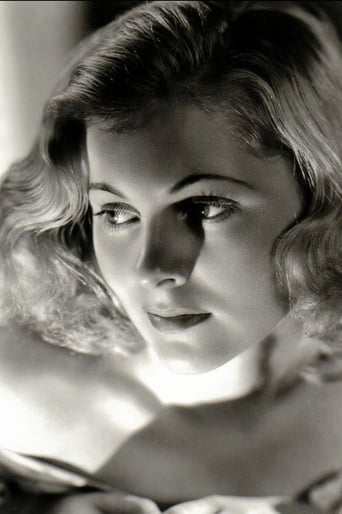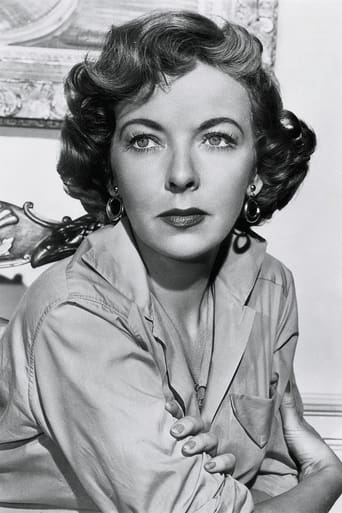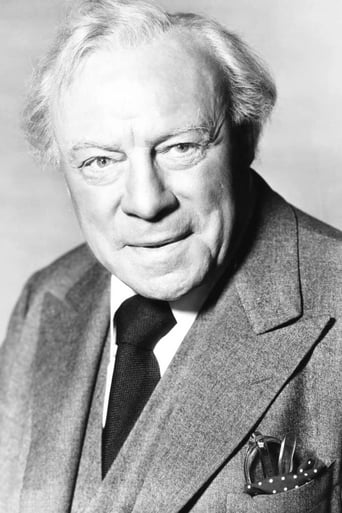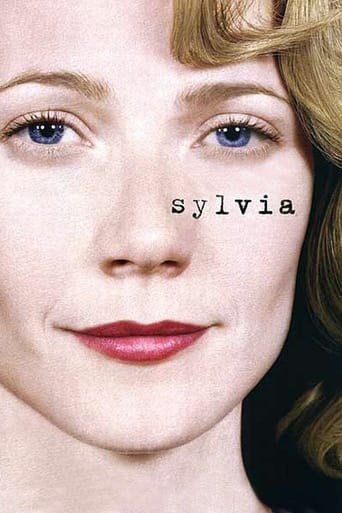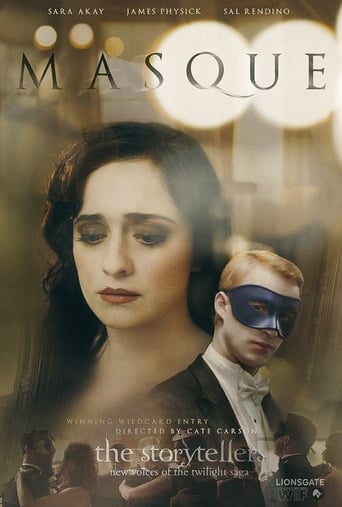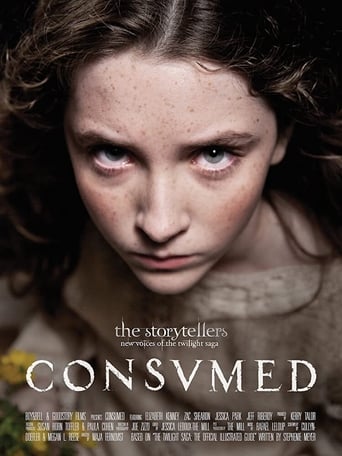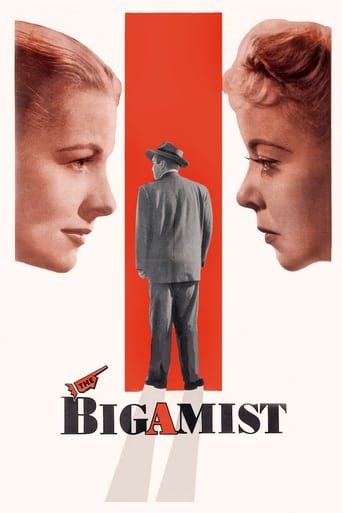
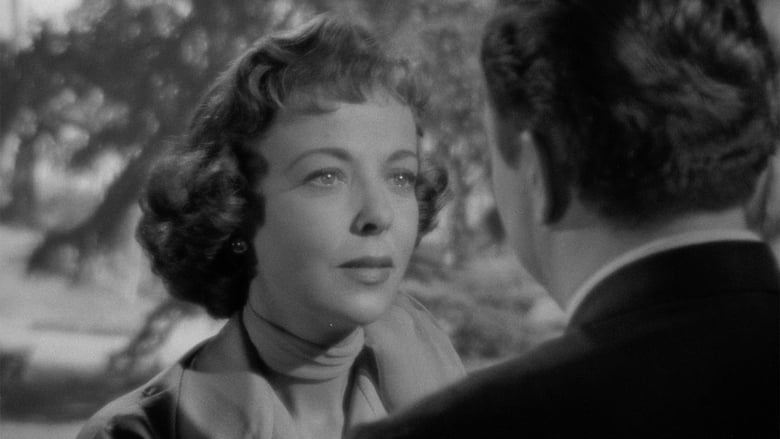
The Bigamist (1953)
San Francisco businessman Harry Graham and his wife and business partner, Eve, are in the process of adopting a child. When private investigator Mr. Jordan uncovers the fact that Graham has another wife, Phyllis, and a small child in Los Angeles, he confesses everything.
Watch Trailer
Cast


Similar titles
Reviews
Edmond O'Brien is horrifically miscast as the titled role- he's always being upstaged by his clearly much more effective two female costars all the darn time-to be fair, they're played by extremely charismatic and extraordinarily gifted actresses. He also does a terrible job acting wise, as he has no idea what to do with his character at all, so he unwisely decides to play him as a confused dope with no characteristics at all- thus, the audience doesn't genuinely care about him in the slightest. It also doesn't help that he is supposed to portray an unlikable character sympathetically but due to his monotone vocal range and his lack of passion in the role, he causes the main subject to become less interesting than the horrendous bus tour that sets the premise up in the first place.The moralizing tone overwhelmed the film's script to the point one would swear they were accidentally watching a Hays Code approved "melodrama" which it totally is. This is the only time Ida Lupino ever completely directed herself and it clearly shows why- she doesn't seem to firmly know which job to pursue first, and without any clear decision making on how to reunite those two prospects together, she exerts an unintentional and overwhelming sense of sloppiness upon the whole film itself. The visuals suffer to the point that it looks more like a juvenile televised soap opera than an independent film made by capable adults. The actors don't know what to do with themselves- sometimes such lack of direction helps spur creativity (Joan Fontaine does a wonderful job at expressing her character's inner thoughts- even more astonishing is Ida's self-determination whilst acting as you can feel that she's doing her best under the rather unfortunate circumstances) but most of the time, it really diminishes the actors' and crew's self-confidence to the point of not being able to do their best within their role. This is downright depressing as Ida Lupino showed her true talents within both departments- just not when they're together on the same project.The script, already hampered and trampled upon by a really unpleasant waging censoring finger, is already hard to swallow within its logic department- why did Edmond O'Brien ever think he could get away with bigamy and why did he go along with his first wife's adoption plans as it was made apparently clear that any place in charge of taking care of minors need to search very deeply within its applicants in order for the child to be placed in safe, and reliable hands; why was Edmund Gwenn even allowed to go back to the orphanage after his monumental and unmentionable failure if said mistake was that severe; if the first wife really was a major operative within the company, shouldn't she have been already to Los Angeles to the point that she's well acquainted with the place? Most importantly, why did he never let his second wife know the truth from the moment that he found out that she was pregnant- heck why didn't he tell anyone about the information as he could explain his mistake and accept full responsibility of the situation much to his newfound moral approval and sensitivity to his spouse's sanity as well as fostering respect for his mistress' dilemmas? Aside from many more logical problems, the script should have been really interesting as it made a social problem much more palatable to moral tastes- it sadly fails because the script's so focused on making the controversial issue palatable to contemporary audience reception that it ultimately makes it blandly heavy-handed to the point that the film quickly wears its welcome out before it can hit any dramatically interesting scenes. It's a true shame, as this was one of the few mature films to openly deal with taboo subjects in a time of insanely restrictive censorship and it's clear that everyone tries their absolute hardest in trying to make a badly written tearjerker seem believable. It's just that no one actually bothered to mend that script up so to make it less puritanical and more openly frank or to rid that same production of any massive tonal failures so as to achieve a sense of control in spreading its ideas. If you're still curious about Ida Lupino's directing career, please check out her other films, especially Outrage- an amazing film both of its time and also ahead of its time in its depiction of rape. Please avoid The Bigamist as one would avoid bigamy in real life.
Traveling Salesman Edmund O'Brien is in a spot. He has been caught as a bigamist and tells how he got into this predicament. In San Francisco, he's already married to a sweet lady (Joan Fontaine) who is like every perfect TV wife. Then, while on business in Los Angeles, he goes on a tour of the stars homes and meets Ida Lupino who happens to be on the tour just because she likes to rest on buses. After seeing the homes of James Stewart, Jack Benny, Barbara Stanwyck, Jane Wyman and Edmund Gwenn (who plays the character O'Brien happens to be telling his story to), they go to the Chinese restaurant where Lupino works. One thing after another happens, and O'Brien finds himself proposing to the ailing Lupino. Once everything is exposed, O'Brien ends up in court where the two wives see each other for the very first time.This is more of a character study than the plot of a movie. It feels like it could be more appropriate for a TV anthology series at under an hour. Lupino is an expert director and actress, and like Fontaine's role, her character is extremely likable. It's understandable why O'Brien would be drawn to both of them. Yet, why the man doesn't find a profession to keep him near his first wife (Fontaine) to prevent his loneliness is never addressed. I longed for an actual speaking scene between Lupino and Fontaine who at different times in their lives (Lupino-prior, Fontaine-current) were married to the same man (Collier Young, who happened to write the screenplay). The film takes a long time to grab any interest, and by that time, it's more because you feel sorry for these characters rather than the pace of the movie.I was rather disappointed in the ending which I felt was a letdown. It gives the impression that the writer wanted to let the audience choose whom O'Brien ended back up with. Still, there's a glorious silent smile between Fontaine and Lupino that says more than a hundred words could.
Considering its resources and it's rather small budget, this is a pretty good movie, from director/actress Ida Lupino. It was made without the backing of any big studios but yet it starred some capable and big name actors in it, no doubt thanks to Lupino's connections in Hollywood. Ida Lupino was quite a big name actress at the time, thanks to roles she played in "High Sierra", "They Drive by Night" and "The Sea Wolf", among others. But due to her age good acting roles were becoming more hard and hard to get by. She then decided to do a not so common thing for a female at the time; she decided to direct and also write movies on her own. Not that she ever became much successful with it though but that seems hardly her fault. There were simply no big studios or producers at the time who dared to back a female director up at time, despite of her good reputation as an established actress. Therefor she got mostly stuck to directing low budget films that never got big releases. This is a real shame, since she definitely had some directing qualities and knew how to bring a good story to the screen.Perhaps with this movie Lupino also tried to make a social statement and address the issue of bigamy, which supposedly was happening on quite a large scale at the time but was of course not much talked about. So seems to me that this movie was handling a quite delicate matter, though the movie doesn't ever try to make a big issue out of it, or try to be preachy about it. You don't really know whether you should hate or care for this man and the situation that he got into, as the Edmund Gwenn character also says in the movie. You don't like him at first or what he is doing but yet you can also grow some understanding for him and hope things will work out for the good of him in the long run.It's pretty obvious that this movie was low budget, especially when you compare it to the other stuff that got done in 1953. It has a simplistic and cheap look over it but the movie sort of overcomes this all, thanks to its good story and the overall handling of it, by the director and actor.This movie has quite some big names in it, next to Ida Lupino herself of course. Edmond O'Brien plays the real main and not so grateful role of the movie. He does handle his character and manages to be unlikeable in the beginning but likely toward the end. Joan Fontaine also stars, as does her mother Lillian Fontaine, in a much smaller role. Definitely a good movie, also especially when consider its limited resources and the fact that a female directed it, in a time when this wasn't really socially accepted in Hollywood.7/10http://bobafett1138.blogspot.com/
Directed by one of it's stars Ida Lupino,The Bigamist tells the story of a world weary travelling salesman who is married to two women.The Bigamist begins with married couple Harry Graham(Edmund O'Brian)and his wife Eve(Joan Fontaine)going to an adoption agency for an interview to see if they are fine to adopt a child.Eve cannot have children and after much soul searching is desperate to try this.They are interviewed by the kindly but suspicious Mr.Jordan(Edmund Gwenn)who is happy with Eve's personality but not sure about Harry's.He's right to be concerned as we learn Harry is also known as Harrison Graham and is married in Los Angeles to the outwardly tough but inwardly fragile Phyllis Martin(Ida Lupino).Graham married her after a night of passion resulted in her getting pregnant.Mr Jordan(who traces Harry to Los Angeles)is told all this but doesn't say anything to the Police believing Harry to have morals enough to turn himself in.With an ending left very much open and some heartbreaking performances, The Bigamist although not a perfect film features a fascinating subject and is entertaining enough.I would like to see more of Ida's directorial work,what she gives us here impressed and moved me and it looks great,this is worth a watch.


